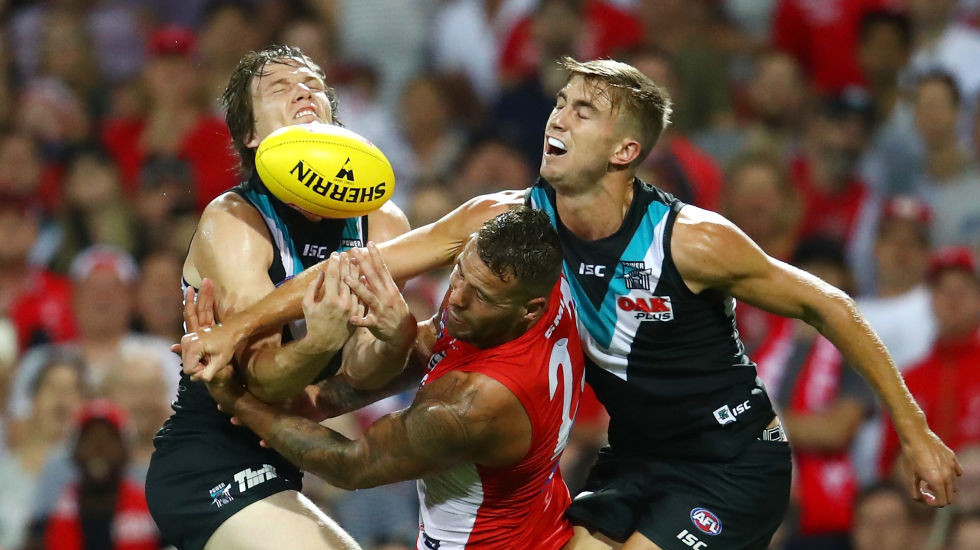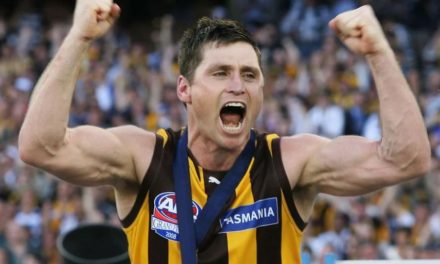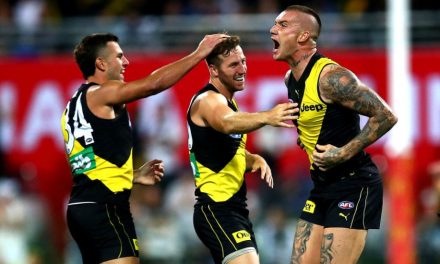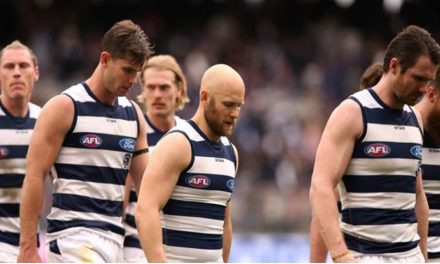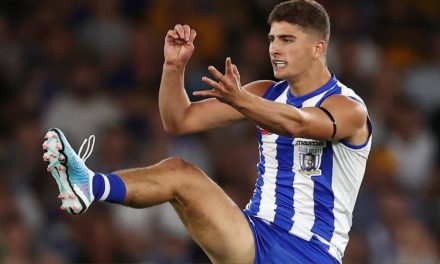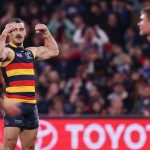Defensive steel: Port Adelaide’s Dougal Howard spoils Sydney’s Lance Franklin during the Power’s round two win over the Swans. Photo: GETTY IMAGES
PORT ADELAIDE 2018 record: 12 wins, 10 losses (10th).
THE INS
Scott Lycett (West Coast), Sam Mayes (Brisbane), Ryan Burton (Hawthorn), Connor Rozee (North Adelaide), Zak Butters (Western Jets), Xavier Duursma (Gippsland Power), Riley Grundy (Sturt), Boyd Woodcock (North Adelaide), Tobin Cox (Glenelg), Kai Pudney (Woodville-West Torrens), Martin Frederick (Woodville-West Torrens)
THE OUTS
Jared Polec (North Melbourne), Jasper Pittard (North Melbourne), Chad Wingard (Hawthorn), Jack Hombsch (Gold Coast), Lindsay Thomas (retired), Jimmy Toumpas (delisted), Emmanuel Irra (delisted), Jake Neade (delisted), Dom Barry (delisted), Will Snelling (delisted)
THE STRENGTHS
Port Adelaide’s defence was very good in 2017, but perhaps it stood out as a strength even more this year given the extent to which the Power fell away in other areas. What made the performance of the backline even more meritorious was the absence of mainstays Hamish Hartlett and Matthew Broadbent, who due to serious injuries managed just five games between them. Key defender Tom Jonas was outstanding and runner-up in Port’s best and fairest, while Darcy Byrne-Jones, Dan Houston and Tom Clurey offered valuable support. Despite missing the eight, Port still finished fourth for fewest points conceded (at a miserly average of 75.1 per game) and conceded on average a goal from only 20 per cent of opposition forward entries (ranked fourth). And until the final two rounds, when the bottom fell out, they’d conceded 100 points or more just twice all season. Despite the loss of some big names, the Power also still boast decent positional flexibility, with a number of their best players able to play midfield roles or at either end of the ground. Port also ranked No.1 on the differentials for uncontested ball in 2018, and fourth for tackles.
THE WEAKNESSES
Port has serially been seen as a flaky side psychologically, a tag which it appeared to have shrugged off until an almighty slump at precisely the wrong time, the Power losing six of their last seven games to slide from a top four spot to an eventual finish of 10th, three of those defeats against teams which didn’t make finals. They serially came unstuck against quality opposition, too, the scoreline against top eight opponents in 2018 an ordinary 3-6. The most dramatic decline structurally was up forward, where the Power went from the AFL’s second-best scoring team in 2017 to only its 13th best, at an average of 80.9 points, three goals per game less than the previous season. Charlie Dixon and Robbie Gray had shared just on 100 goals in 2017. This year, it was 62. That productivity was hardly helped by at times treacle-slow ball movement, the Power seemingly so focussed on avoiding risks going forward that their front 50 at times resembled a car park. Heading into 2019, there might be personnel issues to ponder, also. Jared Polec and Chad Wingard are significant losses to the midfield group, having finished fifth and sixth respectively in the best and fairest. Can the Power confidently expect a pair of up-and-comers to return the same sorts of contribution straight away?
ONE TO WATCH
Had it not been for devastating personal tragedy, Todd Marshall may well have already long graduated from this category. But after the shocking hammer blow of losing both his parents within six months of each other, necessitating extended leave from the game mid-season, then running into injury upon return, Marshall has still played just 10 games of AFL football. He has shown enough even in those, however, to suggest he is exactly the sort of tall forward Port’s ailing forward set-up needs. The 198-centimetre but super-athletic key forward started 2018 in slashing style with seven goals in the first two games. Strong overhead, he’s also very agile for his size. Now with a couple of pre-seasons under his belt and a few more kilos on his frame, Marshall has the potential to be a big part of Port’s forward plans.
UNDER THE PUMP
This guy has been a whipping boy for the entirety of his AFL career, much of that to do with the No.1 draft pick tag which has hung like a millstone around his neck for a decade now. But there’s no escaping the fact that a change of club was the perfect opportunity for Jack Watts to wipe the slate clean and provide real value to a club aspiring to great heights, and in the end it was simply more of the same. Watts came out of the blocks OK for Port with three goals and 20 disposals in a first-up win over Fremantle, but from there it was all downhill. He finished the season having regressed in all key statistics, at just over 14 averaged fewer disposals than in any season since 2010, and at one stage mid-season was dropped. Watts has two years left on his Port deal, but particularly after the loss of some top-end talent, if he doesn’t offer a lot more next year than he did in 2018, that contract may be a moot point.
BEST 22
B: Darcy Byrne-Jones, Tom Clurey, Ryan Burton
HB: Riley Bonner, Tom Jonas, Dan Houston
C: Steven Motlop, Ollie Wines, Travis Boak
HF: Justin Westhoff, Todd Marshall, Sam Gray
F: Scott Lycett, Charlie Dixon, Robbie Gray
R: Paddy Ryder, Brad Ebert, Tom Rockliff
Inter: Dougal Howard, Sam Powell-Pepper, Hamish Hartlett, Jack Watts
Emerg: Matthew Broadbent, Sam Mayes, Jarrod Lienert, Connor Rozee
Massive changes at the top end for the Power in the departure of Wingard, Polec and Pittard, and to be blunt, the “ins” on paper at least aren’t nearly as exciting, though premiership ruckman Lycett offers Paddy Ryder some obvious ruck assistance. Burton, too, has shown real promise for Hawthorn. Brisbane recruit Mayes, though, may struggle to break into the line-up initially. Lienert impressed towards the back end of 2018 and will challenge hard for a spot, but veteran Broadbent, given the length of his absence, has some real work to do to reclaim his spot in the backline.

